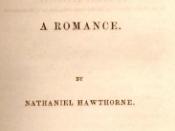Dimmesdale EssayIn a morally sound society guilt is an inevitability. Nathaniel Hawthorne's novel "The Scarlet Letter" is no exception. Puritans adhere to strict morel guidelines all of which are laid down by the bible; a pillar of this belief, among other things is that a woman who is married shall not sleep with anyone but her husband. In the course of time before the book begins Arthur Dimmesdale, a Puritan minister, sleeps with a married woman, Hester Prynn. As a result, Hester is shunned from society and publicly humiliated on a daily basis. Dimmesdale, in direct contrast, has the fortune of escaping punishment due the fact that his "sin" goes undiscovered. He now faces a dilemma, confess and not be allowed to remain in the clergy, hurt Hester and not ever be allowed back to his home, or remain silent and live with crippling guilt. In a different world, confessing would be a great abatement of his pain, however, Hester's presence as well as his status in the community impedes his willingness to be truthful.
Hester is now confined to the outskirts to society as a result of her sin. While she makes daily trips into the town to conduct business and to be shamed she has no time to devote to Dimmesdale. Not surprisingly Hester cares for Dimmesdale and does not want to see him hurt in any way. She knows what the punishment is for what he has done, she is living it, and wants to spare Dimmesdale form that fate. Dimmesdale has been told by Hester not to confess. As a consequence Dimmesdale remains conflicted.
Hester's punishment is not uncharacteristic of Puritan society. One could then speculate that Dimmesdale's punishment would be equally devastating. Upon confessing, he will most likely be expelled from the clergy and forced out of the community. Granted, he is punishing himself, no doubt his self castigation will undoubtedly increase in the wake of public shame and being ousted from the community that he preaches to so avidly to. His sermons give him a reason for living, a purpose of existence and a sense of being alive. Taking that away from him will most likely drive him to more self destruction and possibly suicide. The old saying hits true "the higher up you are the longer you have to fall." That is a very good summary of Dimmesdale's dilemma.
Dimmesdale's status in the community is the other major factor in his unwillingness to confess his sin. The people follow him. He knows this, and just as in the battles of old, people tend to lose direction when their leader is lost. Losing Dimmesdale's leadership within the town could be devastating to the community, the general consensus of the towns people is "Look at the impurities he sees in his soul, imagine what ours are like" then upon finding out that he slept with Hester the towns people would be significantly distraught. In addition, Dimmesdale could not function without knowing he served a purpose or knowing he could not help the people who followed him with such fervor. Dimmesdale's absence and fall from power could most likely cause the community to implode.
Indeed if the circumstances were different Dimmesdale could easily confess and be free of burden; however Hester and his status make it irresponsible for him to confess and to think only of himself. The negative effect on others would be too much and the benefit for Dimmesdale far too little for him to responsibly make the choice to confess. It is sometimes necessary for one to suffer for the good of many, for the sacrifice of one's morals to preserve the way of life for others, for one's pain to ease the pain of others; Dimmesdale is truly expressing extraordinary ability on behalf of his fellow man.
-------------------------------------------------------------works citedNathaniel Hawthorne. The Scarlet Letter: A Norton Critical Edition, 3rd. edn. Eds. Seymour Gross, Sculley Bradley, Richmond Croom Beatty, and E. Hudson Long. New York: W. W. Norton and Co, 1988.





